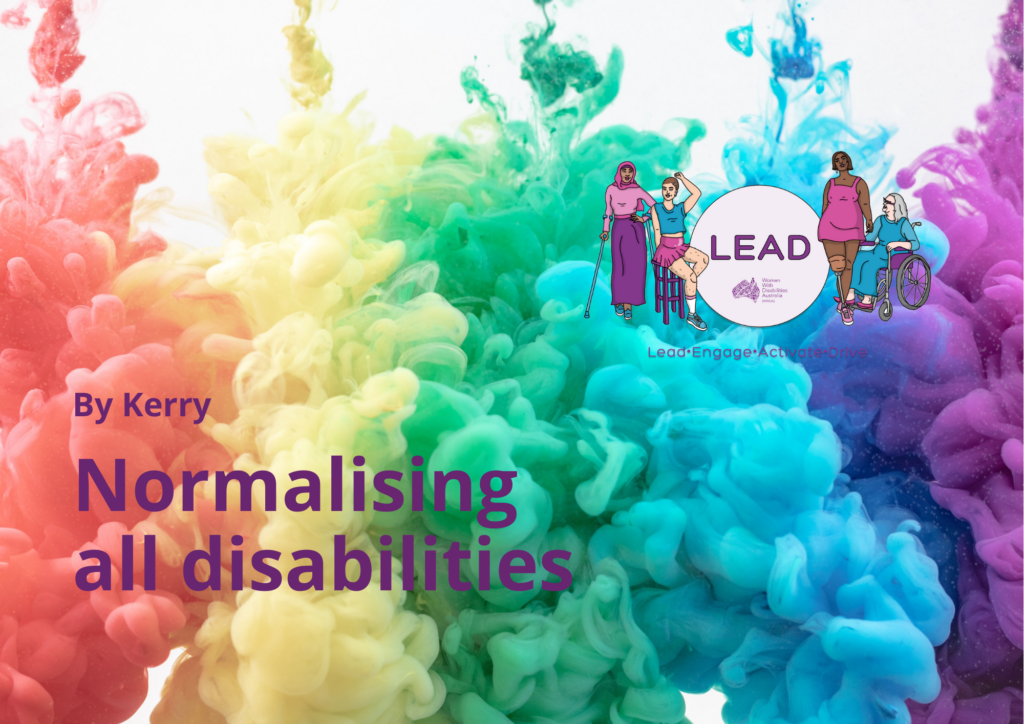By Kelly
This post includes descriptions of anxiety, depression and workplace bullying.
If this post blog post brings up issues for you, please contact Lifeline on 13 11 14 or Beyond Blue on 1300 224 636.
One time I stepped out of a disability services office. An old man walking by looked at the sign above, then at me, and said, “You look too pretty to have a disability.”
Technically, I should have been really angry. It should have triggered my feminist sensibilities, where looks and oppression often meet. I think it was a way of giving me a compliment, perhaps underhanded, suggesting my disability was not that obvious. But that old man struck upon a truth about my disability that was right – it’s not always obvious for many of us living with invisible disabilities.
I suffer from ADHD and depression. These things are often barely detectable. The only time ADHD becomes more apparent is under conditions of stress, where I become more uncoordinated, unfocused and fidgety – all symptoms of ADHD. Flare ups or exacerbation, which gives rise to invisibility, is the same for colitis; arthritis; chronic fatigue and a whole host of other disabilities. We don’t look ill and people often don’t see our illness. Education and representation along those lines leads to normalisation.
I feel the way to normalise disability is also to surprise people. I want people to see the incongruousness I embody – and get a shock. I am not saying we should be pandering to ableism, as in “you should transcend what you’ve got.” Nor am I talking about toxic positivity, as in “we can’t broach anything negative about having a disability or speak up too much.” That won’t get us anywhere. But disability advocacy and the fight for disability rights is so often thought of as ‘too radical,’ that we forget disability is a bipartisan issue that effects everyone across the political spectrum. Do I have to put myself on the outer to be heard? Do I have to be seen as different in order to get my point across? Unexpectedness can have a great impact too. A conservative office worker, who perhaps can’t disclose their affliction, can have as much influence on disability, as the Paralympian.

A photo of lots of colourful umbrellas up in a blue sky.
Photo source: Guy Stevens.
Our current political climate has implications for the workplace and the economy. As we have seen in the case of COVID19, working from home can work in the right circumstances. For me, it would be a miracle! Along with having ADHD, comes anxiety and depression. The physical workplace environment can exacerbate my stress, not to mention workplace bullying, which is lessened by working from home. I want workplaces to take leadership on supporting those with invisible disabilities and commit to continuing to accommodate working from home arrangements in the future. What if a worker has diabetes, or colitis, or one of the many executives working in a high-stress environment starts to feel the impacts on their mental health? Shouldn’t they have home access too?
This makes me think about the way disability is delineated. I believe disability is a lot more prevalent than people realise – as the old man who thought I was “too pretty” demonstrated, it’s not always visible.
I am one of those people who are unable to get disability payments as I don’t fit the criteria of “disabled.” I want workspaces and all things that impact disability to be diversified, so people don’t have to suffer ableism, nor have to prove their disability is beyond reproach, economically.
Many have said to me, even those in disability services, “you don’t appear to be depressed, you seem very strong and self-willed.”
I missed out on receiving disability payments because my disability was not visible and didn’t fit the norm. But I’m okay with not fitting any norm. At the moment, the political climate is either you have a clear disability, or you don’t. I think that’s pandering – disability is nuanced, and until we have broken out of the binary of ‘you either look disabled or you don’t’, we will have barely touched upon the rainbow of experiences disabled people live.
Kerry has been published in Australia and overseas. Working as a massage therapist, cooking, and all things creative, helps with ebbs in writing. Kerry tweets at @kerryMM2.

